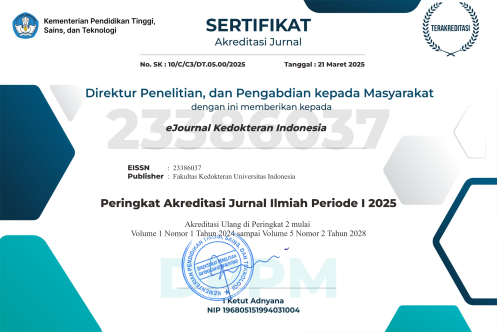Knowledge, Attitude, and Practice of Mothers on the First 1000 Days of Life
DOI:
https://doi.org/10.23886/ejki.9.65.129Keywords:
first 1000 days of life, knowledge, attitude, practice, nutritionAbstract
The first 1000 days of life is the window period which critically determines the children’s growth and development and individual’s health afterwards. The knowledge, attitude, and practice (KAP) of pregnant mothers and mothers with children under two years old greatly influence the optimum upbringing of the fetus and children during the period. This study was aimed to evaluate the KAP of mothers about the first 1000 days of life and its associated factors. A cross-sectional study was conducted at a district in Depok city in August 2017. Subjects were purposively recruited to fill the validated KAP questionnaire on the first 1000 days. A total of 110 subjects were recruited, the higher proportion of them have adequate knowledge (42.7%), good attitude ((62.7%), and good practice (61.8%). The mothers’ knowledge was associated with attitude and practice (p<0.001) but the attitude and practice were not associated (p=0.175). Maternal education was the only factor that associated with knowledge (p=0.018) and attitude (p=0.013) while family income was associated with practice (p=0.018). This finding strengthened the importance of the existing community empowerment program such as posyandu in improving the KAP of mothers to achieve better results in the first 1000 days period of their children.
Keywords: the first 1000 days of life, knowledge, attitude, practice, nutrition.
Pengetahuan, Sikap dan Perilaku Ibu mengenai 1000 Hari Pertama
Abstrak
Seribu hari pertama kehidupan (1000 HPK) adalah periode emas yang sangat menentukan tumbuh kembang anak hingga kesehatan individu pada masa selanjutnya. Pengetahuan, sikap dan perilaku (PSP) ibu hamil dan ibu yang mengasuh anak berusia dua tahun ke bawah sangat menentukan asuhan 1000 HPK yang optimal. Penelitian ini bertujuan untuk mengetahui PSP ibu hamil dan ibu dengan anak berusia di bawah 2 tahun mengenai konsep 1000 HPK serta faktor – faktor yang berhubungan dengan ketiga aspek tersebut. Studi potong lintang dilakukan di Kampung Lio, Depok pada Agustus 2017. Ibu hamil dan ibu dengan anak berusia kurang dari 2 tahun direkrut secara purposif untuk mengisi kuesioner PSP tentang 1000 HPK. Sebanyak 110 subjek direkrut, proporsi terbesar subject memiliki tingkat pengetahuan cukup (42,7%), sikap sebagian besar baik (62,7%) dan perilaku sebagian besar juga baik (61,8%). Pengetahuan berhubungan dengan sikap dan perilaku (p<0.001) tetapi sikap dan perilaku tidak berhubungan (p=0,175). Tingkat pendidikan ibu adalah faktor yang berhubungan dengan pengetahuan (p=0,019) dan sikap (p=0,013). Tingkat penghasilan keluarga adalah faktor yang berhubungan dengan perilaku (p=0,018) mengenai 1000 HPK. Hasil ini menguatkan pentingnya posyandu sebagai upaya partisipasi masyarakat dalam meningkatkan PSP ibu untuk mencapai perkembangan anak yang optimal pada periode 1000 HPK.
Kata kunci: seribu hari pertama kehidupan, pengetahuan, sikap, perilaku, nutrisi.
Downloads
Downloads
Published
How to Cite
Issue
Section
License
Copyright (c) 2021 Indah Suci Widyahening, Muhammad A Aufa, Muhammad F Alhas, Aji B Widodo, Dewi Friska

This work is licensed under a Creative Commons Attribution-NonCommercial 4.0 International License.



